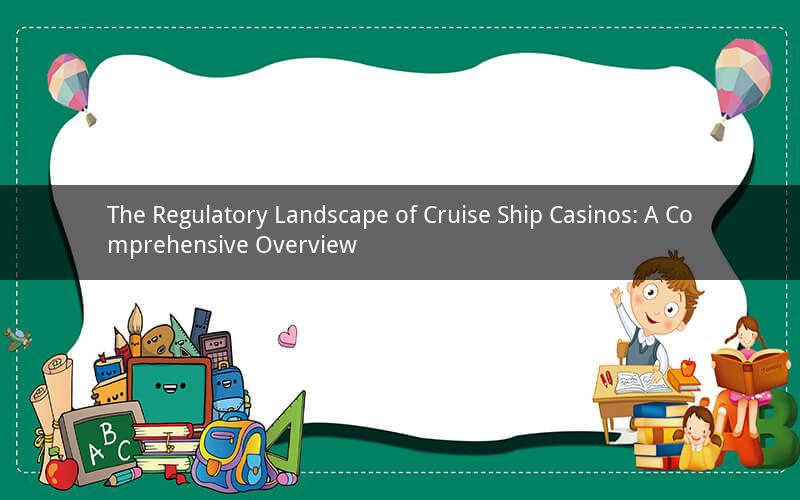
Cruise ship casinos have long been a popular attraction for passengers seeking entertainment and the thrill of gambling at sea. However, with the increase in popularity of these floating casinos, questions regarding their regulation have become increasingly relevant. This article aims to provide a comprehensive overview of the regulatory landscape surrounding cruise ship casinos, exploring the various laws and regulations that govern these establishments.
The first aspect to consider when discussing the regulation of cruise ship casinos is the jurisdiction in which the ship is operating. Cruise ships are subject to the laws of the country in which they are flagged, as well as the countries through which they travel. This often leads to a complex web of regulations, as each country has its own set of rules and standards for gambling.
One of the most important regulations affecting cruise ship casinos is the International Convention for the Suppression of Unlawful Acts Against the Safety of Maritime Navigation (SUA Convention). This convention was established in 1988 and aims to combat piracy and related offenses on the high seas. While the SUA Convention does not directly address the regulation of casinos, it does establish the principle that maritime nations have the right to regulate activities that occur on their flagged vessels.
In the United States, the Federal Maritime Commission (FMC) is responsible for regulating cruise ship operations, including those involving gambling. The FMC ensures that cruise ship operators comply with the Shipping Act of 1984, which requires operators to provide accurate information about their services to passengers. While the FMC does not have direct jurisdiction over gambling activities, it can investigate and enforce regulations related to cruise ship casinos if necessary.
In Europe, the regulation of cruise ship casinos is primarily the responsibility of individual countries. For example, in the United Kingdom, the Gambling Act of 2005 applies to cruise ship casinos operating within British territorial waters. This act requires operators to obtain a gambling license and comply with strict regulations regarding age verification, responsible gambling, and advertising.
Many countries also have specific regulations regarding the operation of casinos on land. These regulations are often adapted to the unique circumstances of cruise ship casinos, which may operate in international waters and are subject to different laws and regulations. For example, the United States has a federal law known as the Wire Act, which prohibits the use of wire communication facilities for the transmission of bets or wagers across state lines or national borders. This law has been interpreted to apply to cruise ship casinos, even when they are operating in international waters.
One of the key concerns regarding the regulation of cruise ship casinos is the potential for money laundering and other illegal activities. To address this, many countries have implemented strict anti-money laundering (AML) regulations. Cruise ship casinos are required to implement AML programs that include customer due diligence procedures, record-keeping requirements, and suspicious transaction reporting.
Another important consideration is the issue of responsible gambling. Cruise ship casinos are expected to promote responsible gambling practices and provide resources for individuals who may have a gambling problem. Many countries require operators to provide self-exclusion programs, as well as information on how to seek help for gambling addiction.
Despite the existence of these regulations, there are still concerns about the effectiveness of cruise ship casino regulation. Critics argue that the fragmented nature of the regulatory landscape makes it difficult to ensure that all operators are complying with the necessary standards. Additionally, the mobility of cruise ships makes it challenging for regulatory authorities to monitor and enforce regulations consistently.
In conclusion, the regulation of cruise ship casinos is a complex and multifaceted issue. While many countries have implemented laws and regulations to ensure the integrity and safety of these establishments, the effectiveness of these measures remains a topic of debate. As the popularity of cruise ship casinos continues to grow, it is essential for regulatory authorities to adapt and enhance their oversight to address the evolving challenges posed by these floating gambling venues.
Questions and Answers:
1. Q: How do cruise ship casinos obtain a gambling license in the United Kingdom?
A: Cruise ship casinos operating within British territorial waters must obtain a gambling license from the Gambling Commission. This involves submitting an application, providing detailed information about the casino's operations, and meeting the Gambling Act's requirements.
2. Q: What are the main concerns regarding money laundering in cruise ship casinos?
A: The main concern is that cruise ship casinos may be used as a conduit for money laundering due to their mobility and the potential for large cash transactions. To address this, operators must implement anti-money laundering programs that include customer due diligence procedures and suspicious transaction reporting.
3. Q: How do cruise ship casinos promote responsible gambling?
A: Cruise ship casinos are expected to promote responsible gambling practices by providing self-exclusion programs, information on how to seek help for gambling addiction, and resources for individuals who may have a gambling problem.
4. Q: What is the Wire Act, and how does it apply to cruise ship casinos?
A: The Wire Act is a federal law in the United States that prohibits the use of wire communication facilities for the transmission of bets or wagers across state lines or national borders. This law has been interpreted to apply to cruise ship casinos, even when they are operating in international waters.
5. Q: How can regulatory authorities ensure the effectiveness of cruise ship casino regulation?
A: Regulatory authorities can enhance the effectiveness of cruise ship casino regulation by adopting a comprehensive approach that includes regular inspections, collaboration with international partners, and the development of best practices for operators to follow. Additionally, authorities can leverage technology to monitor and enforce regulations more efficiently.